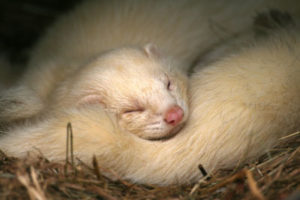As an affiliate, I may earn from qualifying purchases.
 I have used this treatment for a few of my ferrets and it has worked very well, especially at the first sign of hair loss. Make sure to have ferret evaluated by a veterinarian as soon as possible. The implant has to be injected by a vet.
I have used this treatment for a few of my ferrets and it has worked very well, especially at the first sign of hair loss. Make sure to have ferret evaluated by a veterinarian as soon as possible. The implant has to be injected by a vet.
There are many alternatives for treating adrenal disease in ferrets. Most will agree that operation is the best option; yet, an operation is not possible in all cases. The ferret may be a high surgical or anesthetic risk, or the owner just might not have the funds needed. Fortunately, there are several non-surgical alternatives and this informative article will discuss one of these alternatives – the usage of melatonin for both the treatment of adrenal disease as well as the chance of utilizing it as a preventative measure. Lupron Depot is another choice, and while it works fantastically (in this author’s experience) it may be cost-prohibitive in case your veterinarian does not use Lupron consistently and can spread the cost over many clients.
HOW MELATONIN WORKS
Melatonin is a natural hormone that’s released by the pineal gland (a miniature construction found at the bottom of the brain) in response to darkness. Conversely, the release of melatonin is inhibited by light. According to Dr. Jerry Murray, “Melatonin, directly and indirectly, activates the breeding season (spring/summer) during the ‘long day’ intervals, and it terminates the mating season (fall/winter) during the ‘short day’ photoperiods. In the fall/winter there’s released in the spring/summer, and more melatonin discharged during the dark time. Along with the breeding season, the increased melatonin causes the winter fur to enter along with the winter weight gain. Likewise, the low amounts cause the summer fur to come in and the summer weight loss.”
It is not unlikely that the strange lighting to which we subject our ferrets may be at least partially accountable for the high prevalence of the adrenal disease. Their in-home surroundings are light during daylight hours and we add many hours of artificial light in addition to that during the evening hours. This constant lighting causes a natural reduction of the ferret’s production of melatonin and adds to the stimulation (LH) to the adrenal glands.

So just how can melatonin combat the effects of adrenal disorder?
The overproduction of sex hormones is what causes the typical symptoms we see with an adrenal disease in ferrets. Vulva swelling in females, hair loss, prostate swelling in men and aggressive or sexual behavior; more or any one of these symptoms could be present. The effects can often be remarkable if this continuous stimulus could be ceased. Except in some cases of carcinoma, the adrenal glands may get no bigger, and hair grows, the vulva or prostate swelling resolves and in some cases may reduce in size.